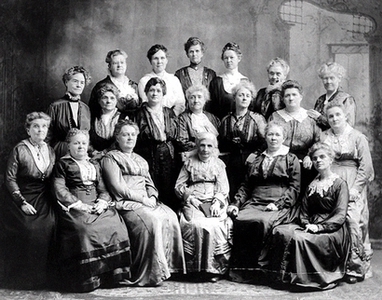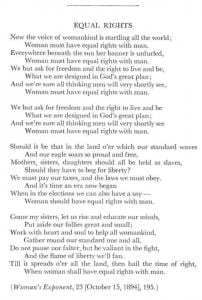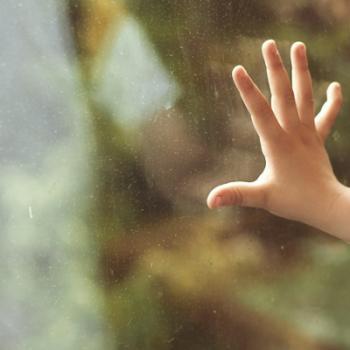This linear thinking of progression, which the majority of the Mormons I know were nursed with, goes something like this:
Line upon line, precept upon precept, we slowly learn and improve, forever, until we become like God.
I like this about Mormonism. I’m all for a growth mindset, but as a Mormon woman in recovery for perfectionism, eating disorders, and people pleasing, I’ve had to learn to set boundaries.
First boundary: I’ve long given up trying to be like God.
This isn’t just because such things, even in the context of Mormon cosmology, are impossible. It’s because Mormon god and I have so little in common. I don’t respect Mormon god like I used to. I stopped being afraid of him. Mormon god has been wrong about a lot of things, if history teaches us anything. Mormon god is full of conflict and hypocrisy and it sounds like he has his own work to do. I have plenty of that to root out in myself, so why would I want to try for more? We don’t need to become like a god who is already just as broken as we are.
If there’s anything I have learned by studying the culture and history of Mormonism it’s that we are really messed up. I don’t say this to be an indictment or a traitor to my people. I say this with affection. We are messed up. And of course we are. We patterned ourselves after a cruel god. It didn’t have to be that way, but where our ancestors could have attributed generosity to god, they instead imbued him with their own frail human bigotry.
That’s not our fault. But what we do with it is.
…….

I spent all day yesterday reading the diaries of three plural wives of an early Mormon leader. It was heartbreaking reading their private thoughts. These three women were suffering in polygamy, all married to the same abusive husband, and they were very lonely. The thinking and stories they told themselves to make sense of the brutal sacrifices their religion required of them is something I’ve seen over and over and over again.
The lies that had to be told to women, to all of us, in order to pull off our theology: those things come with the cost. It doesn’t just seep out in the doctrines of polygamy. It is endemic in every place where our doctrine is exclusionary. Our sustained and perpetual bigotry is one of those costs. It doesn’t just harm others, it harms everybody. I see this harm every day in this broken community.
There is so much I love about Mormonism, but it is bereft of the sacrifice it claims to require. We are not perfect, but we keep pretending we are.
We should be sacrificing our pride and our ego in order to realize that we don’t get to stop working on this stuff. Most of us can’t. We are too scared, too complacent, too fragile to look in the mirrors that hold up how we are complicit in a system that has hurt people. In the church, out of the church, or in-between: it doesn’t mean we are perfect. Who told us we could be perfect?
…….

Recently, there was a dust-up in the feminist Mormon spaces which I inhabit. I became marginally involved after a woman named Stacey Jackson Roberts shared a Facebook post of mine, directed at the sexism in our community, to a feminist group. Stacey used my words to point out that Mormon women, especially Mormon feminist women are also guilty of upholding structural bigotry. As a trans woman and Mormon feminist, Stacey would know.
In usual Facebook fashion, Stacey’s critiques became fodder for internet conflict. In polite terms, it was a shit show, just another example for critics of feminism to say this is just “liberals eating their own.” Her sharing it resulted in a lot of Mormon women becoming defensive. Some were combative, some dismissive, but mostly there were a lot of folks running away from the problem, trying to avoid the conflict.
Women like Stacey have held me through hard times. They have seen me at my worst and likely endured my mishaps and microaggressions when all my mess was at the surface. These women have showed up for me anyway. I want to show up for her in this.
I promise you that in her Facebook post, addressed to Mormon feminists, she was being generous with us. Consider all she has to face in her day. When people point out the truth, they are being generous with us.
I’ve agonized over this often in the spaces within my purview. Mormon spaces will always have problems as long as we are working with other Mormons. To overcome the despair I feel over this, I tell myself the story that I’m trying to bring health and light to a place that has normalized abuse and bigotry, all while unpacking and processing my own. But we can’t escape this. Who told us we could?
I’d like to address my remarks right now toward the Mormon and ExMormon women in my community. I’ve spent the last two weeks coming at the men, but it’s time to get my own house in order for a second.
I am the mother to three specific humans, not to this community. And I don’t pretend to be in charge of anyone else. I am not trying to preach or be condescending. I’m weighing in because all of this makes me feel like the energy that prompted my post became weaponized after someone revealed a truth about our community. I’m sad my own experience and pain with really pernicious sexist men blinded me from realizing how I can cause others such pain, and that Stacey had to be on the front lines on that one, alone. Again.
I’m no stranger to Mormon internet Facebook “drama” such as what happened in another Mormon feminist group this week. I was a blogger and moderator for the Feminist Mormon Housewives facebook group for a decade.
I remember FMH growing through some baby feminist growing pains when we started. We were racist, sexist, baby feminists. (I totally understand what it feels like to be a mod during all this, too. All of you that knew us then know how messed up it all was.)
We were super excited to discover feminism because it finally spoke to our pain. What we didn’t realize was how, as white Mormon women, we contributed to pain outside of us. All of us, even if we didn’t mean to. Even if we didn’t do it on purpose. White Mormons have done immeasurable harm to the LGBTQ+ people, to the trans community, to BIPOC, and to generations of indigenous people. That isn’t even meant to be an accusation. It’s just the truth. Many of us upheld that and many of us uphold it still.
Stacey was bringing this precise critique to the table: Yes, there is a lot of sexism in our Mormon and post-Mormon communities. There is also other bigotry that exists and we are all part of the problem. Like Stacey, I believe the sexism in our communities is similar to the other bigotry Mormon folks uphold. It comes from the same entitlement, the same cosmology, the same fragile whiteness that Mormonism has invested two centuries into. If you are or were Mormon, you invested in this.
I want to talk about that more. I don’t want to stop talking about that. Not because I’m a liberal stuck in the cult of “wokeism” as I’ve been accused of this last week with my misogyny critiques. I want to talk about it because it’s essential to my survival as a Mormon woman who has to live and work, every single day, in a community that isn’t safe for me. I want to talk about it because the unique Mormon spaces that I occupy have shown me how pernicious generational myths can be. I want to talk about them because I’m sick of them hurting me and those around me.
I’m talking about this because I’m begging for you to walk with me in it. I need the community I come from to be worth redeeming. Not from Jesus or a prophet at a pulpit, but worth redeeming within myself.
It is humiliating to have my racism and transphobia pointed out to me. Struggling with perfectionism, I don’t like hearing I’ve made a mistake. After all these years it still shows up over and over. I’d like to think I’ve made progress, but you don’t magically wash these sorts of sins away easily. They linger. They seep into our identity, into the fabric of our thinking, until they become the air we breathe. There’s no such thing as being perfect. That’s the lie I invested in and it makes me fragile against the truth.
The folks that point out that fragility to me are gifting me an opportunity. Those critiques have never steered me wrong. Old ideas still steer me into trouble all the time, but when I learn to be more intersectional, my life is wider and more hopeful. Old ideas only cause hurt and pain.
I’m sure for many cis white Mormon women, hearing critiques like these feel like just one more thing to pile on our to-do list. We are already surviving our own trauma, our own exhaustion. We continue to be triggered by calls to be more humble, since that was weaponized against many of us for so long. This is tricky. Intersecting wounds should be attended to but some need to be done on your own.
…….

Here’s how I attend to my own triggers: I pay attention to who is asking for humility and who is demanding it. I get that it’s hard to tell the difference, since most of the demands made to us came sweetly and over the pulpit. It’s confusing when this is all you know.
White Mormons have long curated a language of obedience, violent in its undertones but gentle in its delivery. As long as things were said sweetly, we could take it. This language we were taught deliberately helped us ignore other information that came in the form of pain, criticism, and feedback. We listen to god and his leaders alone, not the feedback of others when they tell us we are hurting them. It’s the language that privilege separates us by.
My whiteness can’t demand community when whiteness, and my participation in it, has actively sabotaged true community building all along. We participated in a system that demanded Zion be built on exclusion. It can’t work like that with people we call Sisters.
Bigotry isn’t just harmful towards those it is aimed at. It makes the world unsafe for everyone. The risks of perpetuating such bigotry is actually dangerous to all of us. It is dangerous to our community.
Mormonism and its adherents need to contend with the bigotry that we’ve called spiritual truth. Wherever it shows up. Especially as it shows up within ourselves (and not as some cultish duty to virtue signaling and social justice clicktivism.) We need to do it because it’s the right thing to do. Not because I say so, or Stacey says so, but because we were immersed in a religious tradition that required it.
….

I don’t want to think like my grandparents did about race, gender or sexuality. It was poison. I want more of the antidote my ancestors rejected and fortified their hearts against.
I’m not saying this to lecture anyone. The Mormon in me says we are responsible to do something about the inheritance of bigotry many of us have internalized. There should be accountability. It makes sense we don’t know what that means, because we were taught accountability is shown in church courts and in heavenly ones. We don’t know how to navigate conflict and we certainly don’t know healthy ways at approaching resolution.
We need to work on this. It is ugly and painful almost every time. Fragility means we have muscles we aren’t using. This is an opportunity to practice using them. It makes us stronger.
I could say that Stacey has held my feet to the fire before with critiques of my own bigotry, but that’s not quite accurate. She didn’t hold anything to the fire; she just showed me where the fire was and how it burns.
We need to not think people are asking for purity when they ask us to be better. I promise you, Stacey already knows the sacrifices she has to make to be in community with us. We have to sacrifice some of our fragility and learn to be okay with being wrong about things sometimes. We walk and walk and walk through these things, pioneering new paths forward. We will feel tired and beat up. Of course we will. We’re Mormon. We keep walking anyway.











